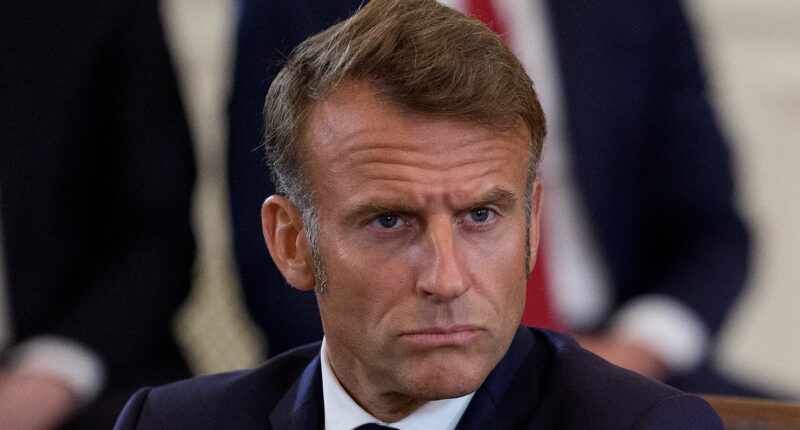Share this @internewscast.com
France is confronting a monumental £2.58trillion ‘debt explosion’ and could soon be compelled to endure the embarrassment of an International Monetary Fund (IMF) bailout as Emmanuel Macron’s administration stands on the brink.
Eric Lombard, the Minister of Economics and Finance, issued a stark warning that ‘a risk exists’ that the IMF will be forced to bail out Paris.
These developments come amid broad predictions that the French Government may collapse in a short span following Prime Minister Francois Bayrou, 74, announcing his intention to pursue a confidence vote in Parliament.
Opposition factions ranging from Jean-Luc Melenchon’s far-Left France Unbowed to Marine Le Pen’s extreme-Right National Rally have pledged to dethrone Bayrou. Even allies within Bayrou’s own party have criticized the decision as reckless, with MP Nicole Dubre-Chirat labeling it ‘suicidal’.
Should he be ousted, the nation would be leaderless and without a fiscal plan at a time when France is burdened by £2.85trillion of debt and confronting a deficit representing 5.4 percent of GDP.
Olivier Blanchard, a former French chief economist for the IMF, indicated that a ‘debt explosion’ would be ‘catastrophic’ for a nation that has not recorded a budget surplus since 1974.
This impending financial crisis serves as a blow to French President Emmanuel Macron, who once prided himself as the ‘Mozart of finance’. The 47-year-old was recently seen enjoying his summer vacation, skimming across the Mediterranean on a jetski.
Lombard said that the Government ‘hopes to and must avoid’ a similar event to the one which hit Britain during the 1970s.

The looming economic crisis comes as a humiliation for French President Emmanuel Macron, who once claimed that he was the ‘Mozart of finance’

It is the second time in a year that the effects of President Macron’s hasty parliamentary dissolution of July 2024 have threatened institutional chaos and even civil unrest

Farmers set a fire as they gather in front of the European Parliament during a protest on the sidelines of a EU summit in Brussels, Belgium, 01 February 2024
Bayrou admitted the nation faced a stark ‘choice between chaos and responsibility’. He told MPs that the upcoming showdown was a ‘moment of truth’ at a time when ‘strength and no longer respect for the law [is] triumphing’ around the world.
Some commentators suggest Bayrou deliberately triggered the vote to go down in history as a martyr for tackling debt crisis. Others claim he still harbours faint hopes of clinging on to power.
Speaking at a union congress on Tuesday, Bayrou declared: ‘The weight of debt, with which we burden… French workers and future generations, is going to crush initiatives and, coupled with the demographic collapse, imperils the country’s social contract.’
In a last-ditch attempt to win support from Left-wing MPs, he floated a tax raid on the rich: ‘Tax breaks that mainly benefit the wealthiest families and big groups will be abolished whenever they are considered unjust or useless.’
But his pleas were ignored. Jordan Bardella, the National Rally’s youthful leader, said the party would ‘never support a vote of confidence in a government whose choices make the French suffer’.
Markets immediately took fright. Shares tumbled, banks with heavy exposure to government debt slumped, and the yield on ten-year French bonds shot above 3.5 per cent.
Lombard admitted: ‘I bet that within a fortnight, our debt will be costing more than Italy’s’.
For Macron, the reversal is humiliating. Anne-Sophie Alsif, the head economist at the BDO consultancy, told Le Parisien that not since the 1960s had French yields been higher than Italy’s.
Even more dramatically, Lombard warned that ‘a risk exists that the IMF will intervene,’ adding that the government ‘hopes to and must avoid’ a scenario echoing Britain’s IMF bailout in the 1970s.

French President Emmanuel Macron flexes his muscles soaking up the sun with his wife Brigitte on August 14, 2025
Hours later, apparently spooked by the chaos his remarks had unleashed, he insisted: ‘The French economy is solid… and we finance our debt without difficulty. We are today threatened with no intervention either from the IMF or from the European Central Bank.’
Bayrou has proposed a brutal package of £37.8billion in cuts and tax rises, including axing two public holidays and slashing healthcare spending. The budget has triggered fury across the political sphere.
His confidence vote, scheduled for September 8, is now seen as the desperate last gamble of a prime minister whose days are numbered.
Boris Vallaud of the Socialist Party said Bayrou had effectively already resigned. Even members of the ruling coalition are looking past him.
MP Nicolas Metzdorf remarked: ‘I hope that a new government will be appointed very quickly.’
Marine Le Pen is calling for fresh elections. Melenchon wants Macron himself to resign, paving the way for an early presidential vote.
But the embattled president insists he will not repeat last year’s shock snap election that plunged the country into deadlock. That decision has already cost him one prime minister – Michel Barnier, who fell after three months – and now threatens to topple Bayrou after just nine.
Adding fuel to the fire, extremists online are mobilising a ‘let’s block everything’ campaign of strikes and roadblocks beginning September 10.
The movement, born in far-Right conspiracy circles but quickly adopted by unions and the Left, has gone viral. Telegram groups are buzzing with plans for ‘citizens’ resistance networks’ and nationwide disruption.

Marine Le Pen’s Right-wing National Rally have vowed to bring Bayrou down (Le Pen pictured during a campaign rally in 2022)

In 2018, violent rioting known as the ‘Yellow Vest’ movement broke out across France after Macron offered economic concessions to his countrymen which were expected to cost the country £9billion following a planned fuel tax hike

A leader of the Yellow Vest movement said that Macron’s peace offering was not enough

French President Emmanuel Macron welcomes a guest at the Elysee Palace in Paris, France, August 27, 2025
And ordinary voters are behind it – a Harris Interactive poll for the RTL radio network this week found 63 per cent of the public support the movement.
At a fiery activist meeting in Orléans, one speaker declared: ‘We have not managed to drive back the bosses, the bourgeoisie and its political class because we haven’t blocked the country.’
Another went further: ‘They have to feel the cannonballs. They have to be scared.’
It is the second time in a year that the effects of President Macron’s hasty parliamentary dissolution of July 2024 have threatened institutional chaos and even civil unrest.
Far from offering the ‘clarity’ that Macron wanted after his defeat in European polls in June 2024, the newly elected National Assembly was split three ways between centrists, the populist Right, and the Left – meaning that no government of any stripe could hope for a majority.
Macron himself was cut out of domestic politics and forced to focus on international affairs.
In 2018, violent rioting known as the ‘Yellow Vest’ movement broke out across France after Macron offered economic concessions to his countrymen which were expected to cost the country £9billion following a planned fuel tax hike.
The president had taken to the national airwaves to address the spiralling crisis for the first time in December. He announced an increase in the minimum wage, tax cuts for retirees and other concessions aimed at calming the streets.
But a leader of the Yellow Vest movement said that Macron’s peace offering was not enough.

The embattled president insists he will not repeat last year’s shock snap election that plunged the country into deadlock

French farmers spent the night on the A4 highway, and mingle underneath an effigy hanging from the overpass above, on January 29, 2024
The crisis began as protests against a planned fuel tax hike – which Macron has abandoned – but quickly mushroomed into a broad and visceral demonstration of anti-government resentment aimed squarely at the president, who was seen by many as being out of touch with the working French.
And only last year, French farmers choked off major motorways around the Paris and threatened to blockade the capital during an intensifying standoff with the government over working conditions, incomes, red tape and environmental policies.
The farmers said the policies undermined their ability to compete with other countries.
Macron offered a series of concessions to the French farmers.
These included abandoning a planned increase in diesel fuel duties, offering the equivalent of some £50million to organic farms, and imposing fines on supermarkets which do not pay enough for French produce.
Although the protest movement has since fizzled out, the frustration remains palpable in the French countryside.

















